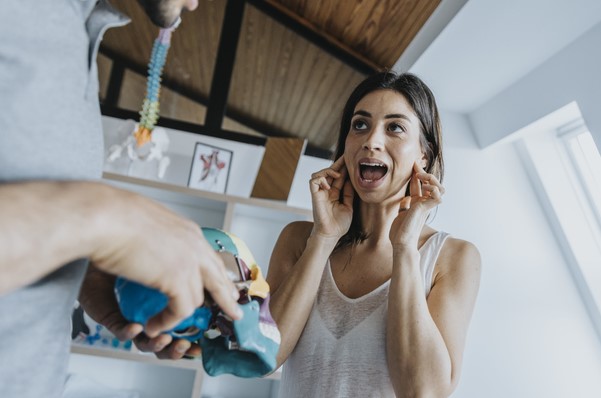-
Our teeth do so much for us. They’re sturdy little pearls, made up of strong, bone-like tissue and wrapped in shiny protective enamel.
But they’re not designed to be clenched together for too long; forcefully grating them against each other night after night can cause problems. Many of us do this without even realising – gritting or gnashing our teeth through a stressful day, grinding them rhythmically back and forth in our sleep. When it becomes a regular pattern, it can cause persistent aches and pains, and potentially more serious damage to the teeth and jaw.
So how do you stop it? We spoke to dentist Dr Jennifer Jiang on what can help you to stop grinding your teeth in your sleep and clenching while you are awake.
What causes teeth grinding?
The cause of teeth clenching and grinding – known as bruxism – can be mysterious. For many people, it seems to be a result of emotional stress, anxiety, tension or anger.
But there’s a range of factors that could be at play. Smoking, caffeine, alcohol and some drugs are all thought to contribute to clenching and grinding teeth. It can also be genetic, or related to other disorders such as snoring or sleep apnoea.
In children, teeth grinding is common. It usually resolves by itself over time, but if you are concerned it is worth raising with your doctor or dentist, as it can be a sign of underlying issues like sleep disorders.
How to stop clenching and grinding your teeth

Signs you have been grinding your teeth
Teeth grinding or clenching most commonly happens in our sleep, which can make it tricky to control or even identify.
But there are some other clues that could suggest you have a bruxism issue, says dentist Dr Jenifer Jiang. Waking up with an aching jaw or a dull headache are telltale signs.
“You can also get pain in the teeth, sensitivity to hot and cold food and drink, earaches, muscular pain in the face, or stiffness and pain in the jaw joint muscles,” Dr Jiang says. “You can have issues with opening up your jaw really wide, or clicking when you’re trying to eat.”

Teeth. You’d literally suck without them.
Our 100% back on dental check-ups are just one of the ways you can get great value from our extras covers. Learn more about how extras cover can help you take control of your health & wellbeing.
How to stop grinding your teeth in your sleep
If you’re grinding your teeth while you’re asleep, addressing the underlying causes and risk factors may help. These risk factors may include stress, mental health issues, sleep problems, drinking alcohol or caffeine, particular medications or the use of illicit drugs.
Your doctor or dentist may be able to help unpack any underlying causes, and provide advice to protect your teeth.
See your doctor
Talk to your GP to try to determine the cause of your grinding and clenching – this will help guide how to manage it.
In some cases, your doctor might prescribe you medication that can relax the jaw muscles, reducing the grinding.
Protect your teeth with a specially fitted mouthguard
To protect your teeth at night, your dentist can fit you with a custom-moulded mouthguard called an occlusal splint, which you wear over your teeth while you sleep. This won’t necessarily stop the grinding action itself, but it will prevent further wear and damage to the teeth, and help give your jaw and face muscles a rest.
Manage stress and your mental health
For many people, managing stress is a useful way to reduce clenching and grinding. Relaxation techniques like meditation, mindfulness and breathing exercises can all be helpful, as can counselling and therapies like cognitive behavioural therapy.
If you think you may be experiencing a more serious mental health issue, like depression or anxiety, your doctor can organise a mental health plan and refer you to some trusted mental health services.
Medibank health insurance members can chat to a mental health professional with 24/7 Medibank Mental Health Support at no extra cost.* Call 1800 644 325 or log in any time of the day or night, 7 days a week.
Improve your sleep hygiene
There are many things you can do that can help improve your sleep. Some simple things include:
- Reduce your caffeine and alcohol intake, particularly in the hours before bed.
- Quit smoking, or avoid cigarettes before bed: The nicotine in cigarettes acts as a stimulant. One of the best thing you can do for your sleep and your health is to quit smoking, but if you do smoke, try to avoid cigarettes for at least 2 hours before bed.
- A regular routine, where you go to sleep and wake up at the same time can help improve sleep.
- Do something relaxing before bed time, and try to avoid screens.
- If you snore or think you may have sleep apnoea, speak to your doctor about your concerns.
Can a sports mouthguard protect my teeth from grinding?
A sports mouthguard can help for protecting the teeth, but the dimensions are not quite right to stop night-time grinding, says Dr Jiang.
“The sports mouthguard material is quite rubbery, so it can actually encourage more nocturnal chewing. It’s better to get a properly fitted night guard from the dentist which is thicker and made of the right material. The mouthguard should work with your resting muscle length dimensions and encourage your jaw muscles to rest."
How to stop clenching your teeth while you’re awake
If you’re clenching and grinding during the day, the first step is to bring your awareness to it, so you can start to break the habit loop, says Dr Jiang.
“If you’re aware of it, remember that you have control during the day, and you can stop the habit,” Dr Jiang says. “Just keep reminding yourself – you know it’s bad for your teeth and your muscles and jaw joints. Try some breathing techniques to relax if feeling tension. Otherwise simply stopping the habit over time should get rid of it during the day at least."
-
Mental fitness explained
Just as you work to strengthen your body, your mental health deserves attention and exercise too.
-
Signs it's time to visit the dentist
Nobody wants to go. But there are good reasons to – promise.
-
The link between stress, anxiety and jaw pain
Physiotherapist Michael Chan explains how stress and anxiety can cause jaw pain, and how to help get some relief.
-
When you can't sleep next to your partner
You love everything about them – except their sleep habits.
-
The 7 best sleep apps
7 apps for deep restorative sleep
-
5 ways to relieve stress
Discover 5 easy stress-relief techniques to calm your mind and body. Try exercise, breathing, outdoor time, positive self-talk, and more for a balanced life.
Things you should know:
* Some referred services may involve out-of-pocket costs.



.jpg)


